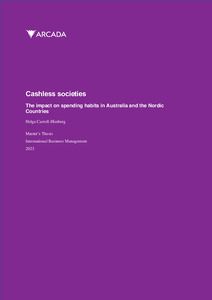Cashless Societies – The impact on spending habits in Australia and the Nordic Countries
Carroll-Himberg, Helga (2023)
Carroll-Himberg, Helga
2023
All rights reserved. This publication is copyrighted. You may download, display and print it for Your own personal use. Commercial use is prohibited.
Julkaisun pysyvä osoite on
https://urn.fi/URN:NBN:fi:amk-2023060621755
https://urn.fi/URN:NBN:fi:amk-2023060621755
Tiivistelmä
The shift towards a cashless society has garnered widespread attention due to the increasing popularity of digital payment methods, FinTech services and a decrease in the use of physical money. This desktop study focuses on analysing the relationship between the decrease in the use of physical money and changes in spending behaviour in the Nordics and Australia as two similar but geographically different societies. These countries offer a compelling analysis of geographically diverse developed economies with robust social welfare systems, low levels of income inequality, transparent political systems, and a high GDP per capita. The research question guiding this study is, "Does the progress towards a cashless society have an impact on people’s spending habits?". To explore this research question, the desktop study is conducted through secondary data analysis using reputable sources to examine the connection between the amount of cash in circulation in a society and household economic indicators. The data is collected from various sources, including national banks, government agencies, and financial institutions. Quantitative research methods were primarily used to collect and partially analyse the data, with the assistance of qualitative methods during the analysis stage to interpret visual graphics and their significance. The results of the desktop study suggest there is not a significant relationship between the amount of cash in circulation and consumers' spending habits. Instead, short-term interest rates were found to have a more substantial impact on the overall cause-effect relation. The findings of the study highlight the need for further research to explore the long-term effects of a cashless society as well as additional consumer behavioural studies. Implications of the shift towards a cashless society are significant for businesses, policymakers, and consumers, making this desktop study particularly relevant and valuable for understanding this complex economic development.
